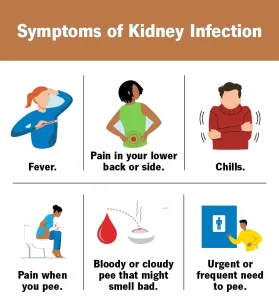Overview
Diagnosis
To diagnose a kidney infection, a urine sample is often used to check for bacteria, blood or pus. A blood sample may also be taken for a culture to look for bacteria or other organisms in the bloodstream.
Additional tests may include:
-
Ultrasound to look at the kidneys and urinary tract
-
CT scan to get detailed images
-
Voiding cystourethrogram, an X-ray test done by filling the bladder with contrast dye and taking images while the bladder is full and during urination
These tests help identify the infection and any underlying issues in the urinary tract.
Treatment
Antibiotics for kidney infections
Antibiotics are the main treatment for kidney infections. The type and duration depend on your health and the bacteria found in your urine.
Symptoms usually improve within a few days, but antibiotics may need to be taken for a week or longer.
It is important to finish the full course of medication, even if you start feeling better.
A repeat urine culture may be recommended to ensure the infection has cleared. If bacteria remain, another course of antibiotics may be needed.
Hospitalization for severe kidney infections
Severe infections may require hospital care. Treatment can include antibiotics and fluids given through a vein.
The length of the hospital stay depends on how serious the infection is and how well you respond to treatment.
Treatment for recurrent kidney infections
Recurrent kidney infections may be caused by an underlying structural issue in the urinary tract.
You may be referred to a nephrologist or urologist for evaluation. In some cases, surgery may be needed to correct the structural problem and prevent repeat infections.
Advertisement

